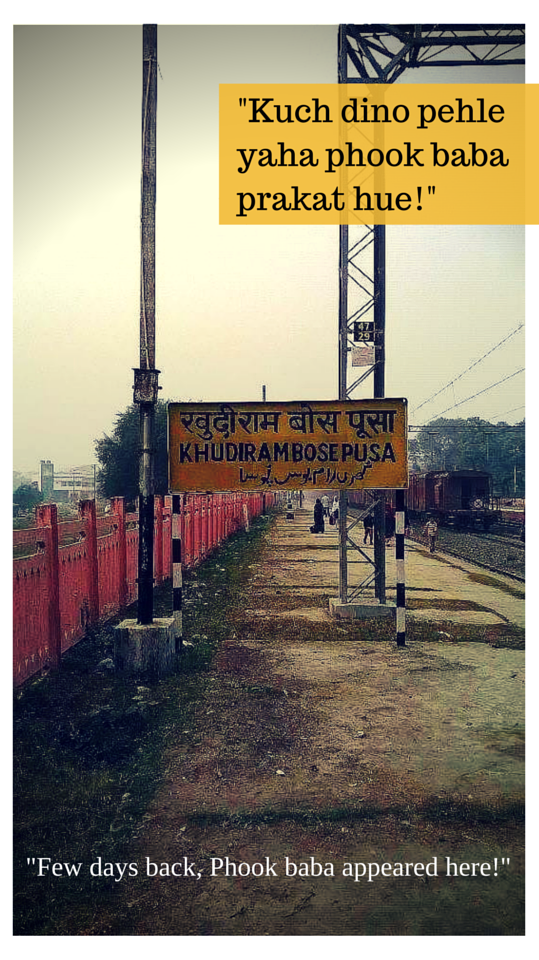
Experiencing Indian Superstition in Pusa as part of the YFI Fellowship
Somil Daga shares with us his initial YFI fellowship experience of staying in Pusa at Samastipur, Bihar.
After 4 weeks of rigorous traveling [Delhi–Pune–Mumbai (transit)–Ahmedabad–Sayla –Ahmedabad–Delhi–Patna–Sakra–Pusa], I have finally found a room to stay in for my 6th week of the rural development fellowship. Having lived out of my suitcase since September, I was eager to finally empty my bags and shift all my clothes into a closet.
Interrogation by a Shopkeeper
So I bought a ceiling fan the day before yesterday evening and started searching for an electrician to have it fixed in my room. As I started my approach toward what appeared to be an electronic goods repair shop, the shopkeeper saw me coming toward his store. By the time I reached him, I could tell that he had already formed a perception about me, probably misconceived, having glanced at what I was wearing (simple jeans and a t-shirt, much different from the traditional lungi and banyan, or pant and shirt worn here). Anyway, it turned out that the electrician had gone somewhere and would be back in 15 minutes. I decided to wait and was offered a seat. What began as a casual conversation ended as an interrogation. I was bombarded with questions, starting from my educational background to my family history to my salary (by now I’ve become quite used to people here asking for my salary directly without any hitch). It forms a major part of what your status is in society and also determines, to some extent, how you are treated.
However, what stood out in the conversation was the look, not of shock but of horror, on his face when I told him that I lived in Delhi. “Aap Delhi, Delhi chhod ke yaha aaye ho? Bihar, woh bhi pusa? Kya soch ke aaye ho yaha?” He now had a smirk on his face, probably thinking what a half-witted person I must be! But I do not blame him for his misguided notion. For people living here, living in big cities is the dream, and no wonder Delhi witnesses the inflow of a large number of migrants from Bihar every year, so much so that I could not get a train back to Bihar from Delhi after Diwali and had to fly back! Nevertheless, I was successfully able to convey to him my viewpoint, telling him that there is an increasing number of youth today striving to work in the development sector and that it is not long before he will see more and more people like me coming and visiting his store. ‘A far-fetched dream?’, I thought to myself as the electrician arrived. I bid the shopkeeper farewell to get my fan up and working. It’s been two days since then, and my fan hasn’t started working yet!
Also Read: The Story of Vedaranyam Salt Satyagraha Unfolded
I suddenly remembered that I had seen something similar just a few weeks earlier—another instance of how the marginalized and weaker sections of society are exploited even more by the nefarious acts of such corrupt people—in the wake of the recent crackdown on the self-styled godman Rampal and his so-called "ashram," which has sparked a nationwide demand for locking up such self-proclaimed messengers of god.
Sharing Autos in Bihar
When I wasn't sure where I wanted to work, about a month and a half ago, I would frequently travel the 25 km from Pusa to Sakra. The shared vehicle I would ride in had a seating capacity of about 7-8 people, but on average, 12 people were able to fit inside, all crammed in, and some even hung outside behind the vehicle, making for a bumpy, uncomfortable, but still interesting ride. Here in Bihar, the idea of sharing autos is very widespread; even in the capital city of Patna, the autos only operate on a sharing basis unless someone is in a rush. With the exception of the safety issue (I heard that a few cars have previously turned upside down), During one such ride, I was sitting right next to the driver in the front seat. I always preferred sitting on the front seat; it was less congested, airier, and relatively more comfortable.
The Power of Faith and Corruption in Society

I used to look outside, think about the tasks that needed to be done that day, about this completely different world I had come to live in, which until now I had only either heard of or read about, and sometimes wonder about life and its meaning. That day, about halfway through the journey, I noticed something different. There was a gray tent, roughly 10 meters long, right at the edge of the highway. In front of the tent, there were two rows of around 100 people each, seated facing each other with a gap of about a meter in between. It looked like they had made a path for someone to come out of the tent and bless them one by one. I noticed that they were all carrying a liquid that looked like oil, was yellow in color, and was packed in a small plastic bottle. Curious, I asked the people in the auto what it was all about. What I heard next was unbelievable! ‘Kuch dino pehle yaha phook baba prakat hue. Ye jab logo pe tel phookte hai toh unki saari beemariya aur saari dikkat khatam ho jaati hai!’ A few days ago, Phook Baba appeared here. When he blows oil on people, their illnesses and problems vanish! Apparently, the liquid that the people were carrying was also an ‘exclusive’ product that Phook Baba had manufactured! “What foolishness! And people really believe in all this?”, I thought to myself instantly. But it was a rather premature thought that I later realized when I sat in rumination that night—were the people really at fault?
Over the next two days, I saw swarms of people traveling 20–30 km, paying the auto fare, and spending three-four hours to get their problems solved by one blow of the phook baba. In a place where people do not have access to safe drinking water and bare minimum access to electricity, they pinned all their hopes on this one man who had just arrived a couple of days before! In our field visits, we saw that a lot of people were not at their homes; when we asked where they were, their answer was as expected: they had gone to visit the new problem solver! It wasn’t surprising that the news had spread like wildfire within two days. Everywhere, everyone was talking about him, relieved that God had finally sent a savior.
It is extremely disheartening, the way such godmen function, thriving on the vulnerabilities of the poor and exploiting their insecurities. But there is no stopping such individuals, because if you catch hold of one today, someone else will crop up tomorrow. So whose fault is it in the end? Who is to take the blame? These questions linger on.
Also Read: The Belief and Uniqueness of Dungar Dev Puja
Instead, this issue must be tackled from the other end—the people. Any development activity being undertaken in an area should be coupled with extensive awareness. This can be done by building deep relationships with the community and breaking these Indian superstitions while mobilizing and motivating them to think progressively. Because it is only then that the community will really be “empowered”.


